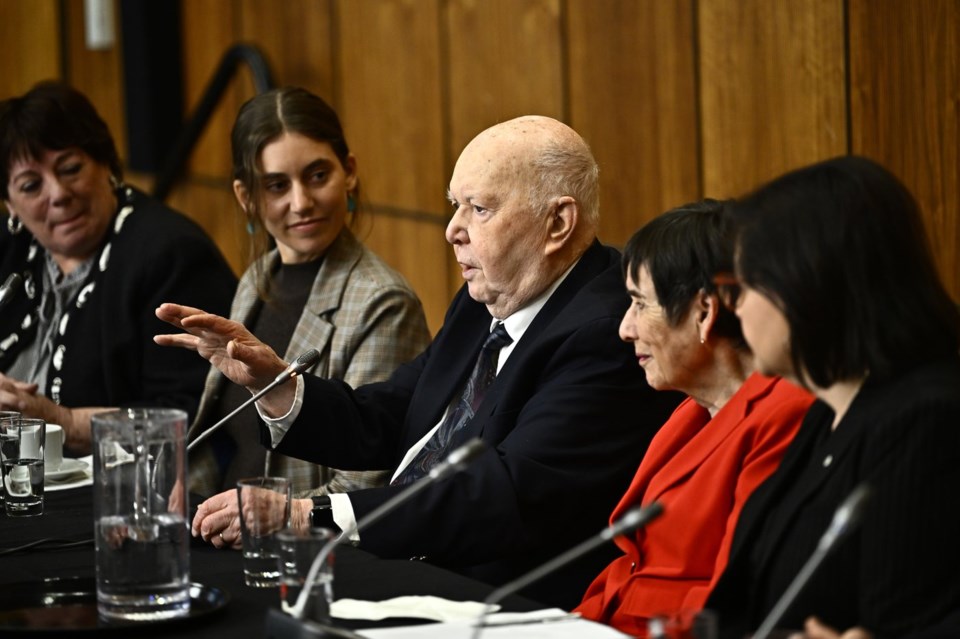OTTAWA — A 95-year-old Holocaust survivor said Friday it's scary to see things he never thought he would see again — such as a powerful man like Elon Musk using a "German salute."
David Moskovic, who lives in Ottawa, was referring to the tech mogul making a straight-arm gesture similar to a Nazi salute as he addressed the crowd assembled for U.S. President Donald Trump's inauguration event on Monday.
Musk said the gesture was meant to convey to the crowd that his heart "goes out" to them.
"I never thought I could see this happen, and it's sad because (Musk) has lots of power. He has lots of input with the president of the United States," Moskovic said, in an interview.
"I would have never thought this would happen in my lifetime, and it's happening. It's scary what's happening right now in the United States."
Moskovic also castigated Trump for pardoning more than 1,500 Jan. 6 protesters — including people who had been charged with assaulting police officers — and for saying Canada should become the 51st state.
"(Trump) doesn't go to his government to make decisions. He makes the decisions as one person. That's scary, that's a dictatorship. The thing is, he told everybody before the election what he's going to do and they voted for him anyways," Moskovic said.
The Anti-Defamation League, an American Jewish advocacy organization, said Monday that Musk seemed to have made an "awkward gesture" and not a Nazi salute.
On Thursday, responding to the controversy, Musk posted a series of Nazi puns on X, the social media platform he owns.
Anti-Defamation League CEO Jonathan Greenblatt condemned the posts, saying the Holocaust was a "singularly evil event" and "not a joke."
Moskovic joined other speakers in Ottawa on Friday at an event to mark the upcoming 80th anniversary of the liberation of Auschwitz-Birkenau, one of the most infamous Nazi death camps, on Jan. 27.
Moskovic was 14 when he was taken to Auschwitz along with his mother, father and brother. He's the only one of the family who survived.
In a speech at the memorial event he described being taken to Auschwitz from his home village Konus, now part of Slovakia.
Moskovic said that after he arrived at the death camp, he saw piles of shoes and clothes and people being placed in two lines. He, his father and brother were put in one line, while his mother was made to join another.
People in Moskovic's line were taken to the camp's barracks and put to work. Moskovic worked as a bricklayer, repairing buildings in the camp damaged by allied bombs.
Those in the other line went to the gas chamber.
Moskovic told his story in a calm, matter-of-fact tone. He was moved to tears, however, when his granddaughter, Hannah Alberga, delivered a speech on what she learned from her grandfather's story.
Alberga is a health reporter for The Canadian Press.
"I never knew she was capable of delivering such a beautiful speech. That's what education does. People learn things," Moskovic said.
Participants in a panel discussion at Friday event talked about how to continue sharing stories like Moskovic's as the number of living survivors continues to dwindle.
Naomi Azrieli, whose foundation established the Holocaust Survivor Memoirs Program, said school programs are essential but they can't be seen as the end point of Holocaust education.
Azrieli said those fighting antisemitism and Holocaust disinformation need to rethink how they push back against lies online.
"The best way to fight (antisemitism) is with the same tools. Some of the most effective tools we've seen are actually influencers. There are Holocaust survivor influencers. There are people talking about this history in a way that is accessible, and yet respectful," she said.
Azrieli said that while the thought of people learning about the Holocaust through TikTok videos makes her "cringe," it's an effective tool when coupled with links to more robust sources.
Non-affiliated Quebec Sen. Marc Gold said a lack of regulation has allowed social media algorithms to create online echo chambers for Holocaust denial.
"Getting it right, because I'm a free speech guy, is really challenging. But that is a critical component if we're going to make any progress forward," Gold said.
While Moskovic said he's worried about the future, he still enjoys a "beautiful" life in Canada.
He said he built a successful plumbing and heating business, was married to his first wife for over 51 years, found love again and is in good health.
"I wish my parents could see what I did in my life. That would have been my biggest pleasure," he said.
This report by The Canadian Press was first published Jan. 24, 2025.
David Baxter, The Canadian Press

